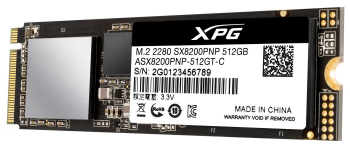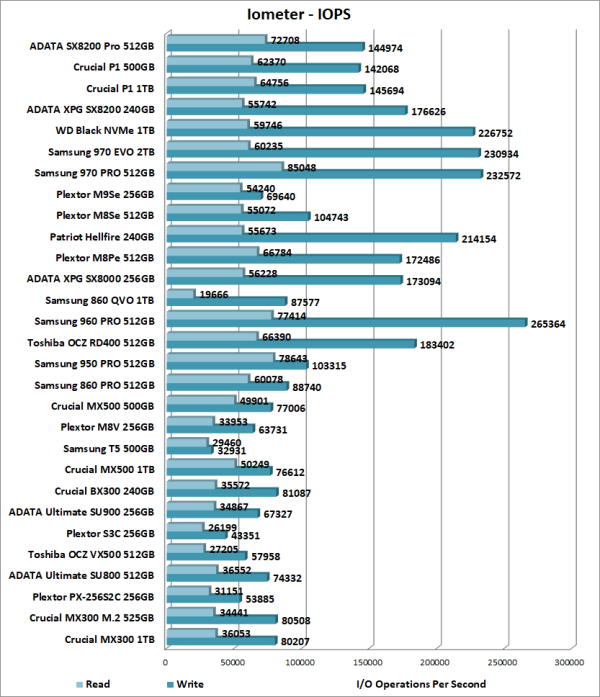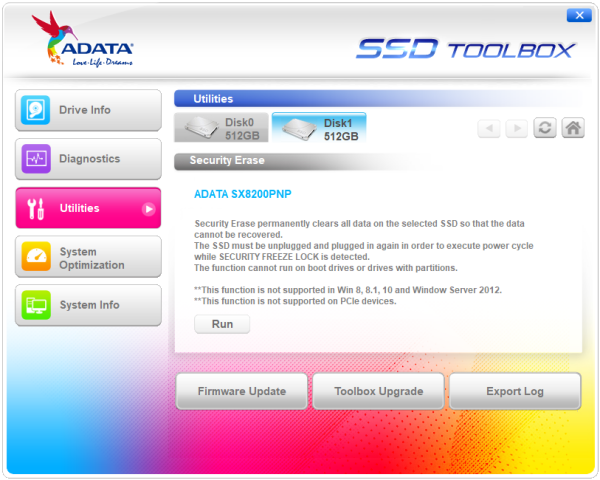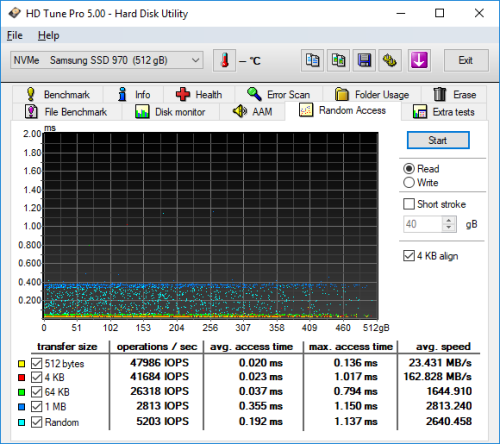

Model: ADATA XPG SX8200 Pro 512GB PCIe M.2 Solid State Drive
Manufacturer: ADATA Technology
Provided By: ADATA Technology (USA)
ADATA Technology is one of the world's leading manufacturers of high performance memory modules and data storage solutions. Founded in 2001 with a staff of 20, this Taiwanese company set itself apart from the competition early on thanks to its professionalism, industry know-how and eye-catching product designs. Today, ADATA continues to lead the way through constant innovation and development of products that exceed customer expectations. Backed by technical expertise, state-of-the-art manufacturing facilities and premium customer service, ADATA currently offers a variety of products including DRAM modules, USB flash drives, memory cards, solid state drives and portable hard drives.
ADATA recently launched its fastest PCIe SSD to date, the XPG SX8200 Pro. Designed for avid PC enthusiasts, gamers and overclockers, this M.2 form factor drive is powered by Silicon Motion's new SM2262EN controller and is available with up to 1TB of Micron's 64-layer 3D TLC NAND flash. The SX8200 Pro also utilizes intelligent SLC caching and a DRAM cache buffer to accelerate read and write speeds along with LDPC error correction, E2E Data Protection and a RAID Engine for greater data integrity. To top it all off, the SX8200 Pro is equipped with an ultra-fast PCIe Gen3 x4 NVMe 1.3 interface and is capable of 3,500 MB/s read and 3,000 MB/s write speeds and a maximum of 380,000 random write IOPS.
The XPG SX8200 Pro is available in 256GB, 512GB and 1TB capacities. For this review, ADATA sent us the 512GB version of the drive which is capable of delivering up to 3,500 MB/s sequential read and 2,300 MB/s sequential write speeds as well as up to 390,000 random read and 380,000 random write IOPS.
| ADATA XPG SX8200 Pro 512GB PCIe M.2 Solid State Drive | |||||||||||||||||||||||||||||||||||||||||
General Specifications
Performance
Reliability
Power Consumption
Environmental
Dimensions and Weight
Other Features
|
Needless to say, this is only a taste of what the XPG SX8200 Pro has to offer. To give you an idea of what to expect, we'll take a closer look at ADATA's new PCIe SSD and then see how well it performs. Does the SX8200 Pro have what it takes? More importantly, is it the best bang for your buck? Keep reading as we find out.
The XPG SX8200 Pro comes in a small black box. Along with a picture of the drive, the front advertises many of its key features including its 512GB capacity, PCIe Gen3x4 interface, NVMe 1.3 support and 3D NAND. The back of the box provides a bit more information regarding the SX8200 Pro's features and performance. Inside, you'll find the SSD as well as a black, aluminum heatsink that can be attached to the drive.

Physical Features:
The XPG SX8200 Pro uses the 2280 form factor for M.2 (NGFF) SSDs. It measures 22 x 80 x 3.5 mm and tips the scales at a mere 8g. The drive also has an "M key" edge connector which provides PCIe SSDs with up to 4x lanes of bandwidth.

Like ADATA's XPG Gammix S11 Pro SSD, the SX8200 Pro uses Silicon Motion's SM2262EN controller. This 8 channel, PCIe Gen 3 x4 SSD controller is powered by a dual ARM Cortex CPU and offers support for 3D NAND from the main flash suppliers. The SM2262EN also employs Silicon Motion's proprietary NANDXtend error-correcting code (ECC) technology to enhance the endurance and retention of 3D NAND.


For the 512GB version of the SX8200 Pro, ADATA has opted to use Micron's 64-layer 3D TLC NAND flash. Looking at the picture above, you can see that there are two 128GB NAND flash packages on either side of the PCB. The drive also has a pair of 256MB NANYA DDR3L memory chips that are used for caching.

The aluminum heatsink included with the SX8200 Pro is simple, yet functional. It attaches to the top of the drive using thermal adhesive and does have a small, yet measurable, impact on temperature. I found that, with the heatsink installed, the SX8200 Pro's temps dropped by a few degrees during idle periods and heavy workloads.
Like ADATA's other SSDs, the XPG SX8200 Pro works with their SSD Toolbox. This free downloadable utility is an easy way for users to obtain information about their drives and change various system settings. Additionally, it can be used to speed up your SSD and even improve the endurance of a drive.
When you run ADATA SSD Toolbox, the main screen displays information about your drives. From here, users can view information like the capacity, used space, temperature, health and lifespan of each drive. By clicking on the tabs, you'll also find information like the model name, firmware version and serial number and connection speed.

The SSD Toolbox offers two different diagnostic scans. The quick diagnostics scan runs a basic test on free space and is usually completed in under two minutes. The full diagnostics scan runs a read test on all used space and a write test on all free space of the selected drive. Needless to say, the full scan takes much longer to complete.

ADATA's SSD Toolbox also includes a number of utilities. Along with the ability to do a secure erase, users can update a drive's firmware, upgrade the software and export a log file containing information about your system and drives.
The System Optimization option gives users the ability to run a TRIM command on a selected SSD. Users also have the ability optimize their OS by enabling features like superfetch, prefetch and automatic defragmentation.
SSD Toolbox can also be used to view information about your system. The utility displays a number of things including the operating system, CPU, amount of usable RAM and the model and BIOS version of your motherboard.
The test system used in this review is equipped with an Intel Core i7-6700K CPU, GIGABYTE GA-Z170X-UD3 motherboard, 32GB (16GB x 2) of Crucial Ballistix Sport LT DDR4 memory, Samsung 960 PRO 512GB SSD and a GIGABYTE GeForce GTX 1060 WINDFORCE OC 6G graphics card. For the operating system, I installed a fresh copy of Windows 10 Enterprise.
To test the performance of ADATA's SX8200 Pro SSD, I ran a series of benchmarks using CrystalDiskMark, HD Tach RW, ATTO Disk Benchmark, AS SSD, HD Tune Pro, Anvil's Storage Utilities, Iometer and PCMark 8. For comparison, I've also included test results from the Crucial P1, ADATA XPG SX8200, Western Digital WD Black NVMe, Samsung 970 EVO, Samsung 970 PRO, Plextor M9Pe, Plextor M8Se, Patriot Hellfire, ADATA XPG SX8000, Samsung 960 PRO, Toshiba OCZ RD400, Samsung 950 PRO, Samsung 860 QVO, Samsung 860 PRO, Crucial MX500, Plextor M8V, Samsung T5, Crucial BX300, ADATA Ultimate SU900, Plextor S3C, Toshiba OCZ VX500, ADATA Ultimate SU800, Plextor S2C and Crucial MX300.

As I mentioned earlier, the XPG SX8200 Pro is based on SMI's SM2262EN controller chip. Looking at the screenshot above, you can see that it performs equally well with both incompressible (0%) and compressible (100%) data.
CrystalDiskMark 5.1.2:
First, I ran a few quick tests using CrystalDiskMark. This benchmark tool measures the performance of a storage device by testing its sequential read and write speeds as well as its random read and write speeds using blocks 512K and 4K in size.
According to ADATA, the 512GB version of the SX8200 Pro is capable of reading at 3,500 MB/s and writing at 2,300 MB/s when tested with CrystalDiskMark. Looking at the screenshot above, you can see that the drive had no problems reaching these speeds in CrystalDiskMark's sequential read and write tests.
The SX8200 Pro performed equally well when using highly compressible 0x00 (0 Fill) data. This time around, the drive was able to read at 3,517 MB/s and write at 2,309 MB/s.
HD Tach RW 3.0.4.0:
Next, I used HD Tach to test the SX8200 Pro's read, write and burst speeds as well as its seek times and CPU usage.

Looking at the screenshot above, you can see that the SX8200 Pro had average read and write speeds of 1631.8 MB/s and 606.4 MB/s respectively, as well as a burst speed of 1190.3 MB/s. The screenshot also shows that, like most other TLC-based SSDs, the SX8200 Pro uses some sort of SLC caching. The drive starts writing at about 1,500 MB/s and then drops to about 550 MB/s when the write operation exceeds the size of the cache. Oddly enough, the SX8200 Pro's write performance dropped yet again about 2/3 of the way through the test.
ATTO Disk Benchmark 2.46:
I also used ATTO Disk Benchmark to test the SX8200 Pro's sequential read and write speeds. The tests are run using blocks ranging in size from 0.5KB to 8192KB and the total length set to 256MB.
When tested with ATTO, the SX8200 Pro's read speeds topped out at about 3,338 MB/s and its write speeds at 2,259 MB/s.
AS SSD:
AS SSD is a relatively new benchmark designed specifically for solid state drives. The application contains five synthetic tests used to determine the sequential and random read and write performance of a drive.
AS SSD also includes a copy benchmark. This test copies an ISO (two large files), program (many small files) and game (small and large files), returning the speed and duration of each.
HD Tune Pro 5.00:
Next, I ran a series of tests using HD Tune Pro. This hard disk utility measures a drive's performance by testing its sequential read and write speeds as well as its access time, burst rate and CPU usage. For this review, I'm also going to use it to benchmark the SX8200 Pro's random read and write speeds, random access times and the number of operations per second.
The SX8200 Pro performed relatively well when benchmarked with HD Tune. The drive had average read and write speeds of 2171.2 MB/s and 788.0 MB/s, respectively, and a burst rate of about 221.0 MB/s when reading.
When writing 4KB blocks, the SX8200 Pro reached 27,207 IOPS and had an average speed of 106.278 MB/s. The drive was even faster when reading, reaching 28,353 IOPS with an average speed of 110.756 MB/s.
Anvil's Storage Utilities:
Anvil's Storage Utilities is another benchmark designed with SSDs in mind. The standard storage benchmark measures a drive's performance by testing its transfer speeds, access times and IOPS.

Iometer:
Lastly, I ran a series of tests using Iometer. This tool can be configured to benchmark a number of things. In this case, I used it to measure the SX8200 Pro's read and write speeds and the number of operations per second. The tests were run using random bytes and a queue depth of 3.

The SX8200 Pro's performance was very similar to what we saw in our other tests. The drive was able to read at 2468.54 MB/s and write at 2124.21 MB/s.

The SX8200 Pro also performed fairly well when doing random reads and writes. In our tests, the drive was able to read at 284.02 MB/s and write at 566.3 MB/s.

According to ADATA, the 512GB SX8200 Pro is capable of 390,000 IOPS when reading and 380,000 IOPS when writing 4K blocks. In our tests, the drive reached 72,708 random read IOPS and 144,974 random write IOPS. As with most drives, the SX8200 Pro performed better at higher queue depths. With four threads and the queue depth set to 32, it reached 357,897 random read IOPS and 311,101 random write IOPS.
PCMark 8 - Storage Test:
PCMark 8 is a complete benchmark for Windows. It includes five benchmark tests, each designed around a specific scenario. The storage benchmark measures drive performance using real-world traces recorded from Adobe Creative Suite, Microsoft Office and a selection of popular games.

PCMark 8 also includes a consistency test which measures the performance consistency and degradation tendency of a storage system. The test reports the performance level at the start, the degraded steady-state and the recovered state as well as the number of iterations required to reach the degraded state and the recovered state. For this test, we are focusing on the Adobe Photoshop (Heavy) trace and will look at both the bandwidth and latency of the drive


The SX8200 Pro didn't do as well as some of the other drives in this test. Its bandwidth dropped below 100 MB/s during the degradation and steady phases, pushing its latency above the 400ms mark. The SX8200 Pro's performance increased somewhat during the recovery phase. However, it lagged well behind the drives from Samsung and Western Digital, topping out at only 623 MB/s.
TRIM Performance:
While SSD's offer many benefits, there are some downsides to using flash memory. One of the biggest issues people run into is performance degradation. Over time, an SSD will run out of fresh blocks and will have to write over data the file system has marked as deleted. This procedure is very complicated and can slow an SSD's write speeds considerably.
To fix this problem, most manufacturers have added TRIM support to their SSDs. The TRIM command allows an operating system, such as Windows 7, to tell an SSD which data blocks are no longer in use. Using this information, the drive pro-actively erases these blocks and adds them to the free block pool.

To test the SX8200 Pro's TRIM and garbage collection functions, I first put the drive in a "dirty" state. I used Iometer to fill 80% of the drive and then ran a random write test for 30 minutes. This had little impact on the SX8200 Pro's read speed. However, its average writing speed dropped to 183.91 MB/s.

ADATA SX8200 Pro - Dirty
To see how well the SX8200 Pro could recover, I let the computer sit for about 30 minutes and then reran the test. The drive wasn't able to reach the factory fresh performance shown in our earlier tests. However, its sequential write speed jumped up to 2015.53 MB/s.

ADATA SX8200 Pro - After TRIM
Lastly, I used Parted Magic to perform a secure erase on the SX8200 Pro. With the drive wiped clean, it had average read and write speeds of 3025.45 MB/s and 2035.94 MB/s, respectively.

ADATA SX8200 Pro - Secure Erased
Final Thoughts:
The ADATA XPG SX8200 Pro is an excellent choice for the gamer, enthusiast or overclocker looking for a fast, yet affordable, NVMe SSD for their notebook or desktop computer. This compact, M.2 form factor SSD is powered by Silicon Motion's SM2262EN controller and is available with up to 1TB of Micron's 64-layer 3D TLC NAND flash. Combine this with an ultra-fast PCIe Gen3 x4 NVMe 1.3 interface and you have a drive that is capable of outpacing your average SATA 6Gb/s SSD by a considerable margin. The 512GB version of the SX8200 Pro flew through our sequential transfer rate tests, reading at speeds as high as 3,517 MB/s and writing at more than 2,259 MB/s. The drive also did fairly well in our random write tests, producing more than 144,000 IOPS at low queue depths.
Of course, fast read and write speeds aren't the only things the XPG SX8200 Pro has to offer. In addition to a large DRAM cache buffer, the drive uses an intelligent SLC caching to boost read and write performance. The SX8200 Pro also features advanced LDPC error correction technology, E2E Data Protection, and a RAID Engine to ensure data integrity and extend the lifespan of the SSD. To top it all off, the drive comes with a sleek black XPG heatsink and is backed by a 5 year warranty.
The XPG SX8200 Pro is available now in 256GB, 512GB and 1TB capacities. Prices on Amazon.com currently range from $59 up to $205, with the 512GB version reviewed here retailing for about $105.

Highs:
- Available in 256GB, 512GB and 1TB capacities
- PCIe 3.0 x4 interface with NVMe protocol
- Silicon Motion SM2262EN controller
- Equipped with Micron 64-layer 3D TLC NAND
- Good sequential and random read and write performance
- RAID Engine, E2E Data Protection and LDPC ECC technologies
- Small M.2 2280 form factor
- Intelligent SLC caching
- Large DRAM cache
- Includes heatsink
- Works with ADATA's SSD Toolbox software
- Reasonably priced
- 5 year warranty
Lows:
- Write speed drops considerably when SLC cache is full
- Does not support hardware based encryption
























